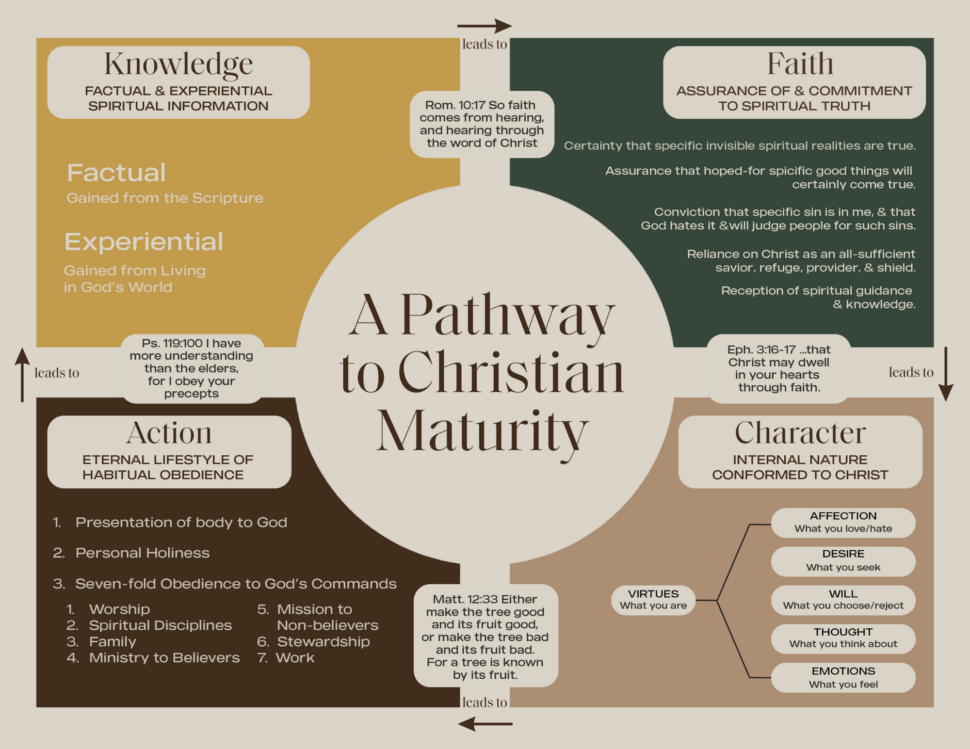
The essence of the saving work of Christ is the transformation of the heart from within, which leads to our conformity to his likeness and shapes our will, thoughts, desires, and emotions.
HEART: Will, Thought, Emotion, Virtues
I. Review
A. Christianity a Heart Religion
B. Overview
Affection: What you love and what you hate
Desire: What you seek
Will: What you choose and what you reject
Thought: What you think
Emotion: What you feel
Virtues: What you are
II. Will: What You Choose and What You Reject
A. The Freedom of the Will: a constant debate among philosophers and theologians
B. The Will: Servant of the Heart
C. Free Will a Slave you are unwilling to come to Me so that you may have life. (John 5:40)
O Jerusalem, Jerusalem, you who kill the prophets and stone those sent to you, how often I have longed to gather your children together, as a hen gathers her chicks under her wings, but you were not willing. (Matthew 23:37)
So, human salvation cannot depend on our will
So then it depends not on human will or exertion, but on God, who has mercy. (Romans 9:16)
D. Transformation at Regeneration
I will give you a new heart and put a new spirit in you; I will remove from you your heart of stone and give you a heart of flesh. And I will put
my Spirit in you and move you to follow my decrees and be careful to keep my laws. (Ezekiel 36:26-27) E. A Bitter Struggle for Control
I do not understand what I do. For what I want to do I do not do, but what I hate I do. (Romans 7:15)
Paul probed deeper, speaking of good desires that he, for some reason never chose to do:
I have the desire to do what is good, but I cannot carry it out. (Romans 7:18)
When Paul acknowledges that he does what he hates, he admits a certain dual nature within us, the presence of “sin living in me.”
As it is, it is no longer I myself who do it, but it is sin living in me. (Romans 7:17)
Indwelling sin sometimes “hijacks” our wills and causes us to do that which our new nature hates
F. Imitating Christ in Gethsemane
1. God made the cup of God’s wrath that Christ was about to drink intensely real to Jesus
And he taketh with him Peter and James and John, and began to be sore amazed, and to be very heavy. (Mark 14:33, KJV)
2. Jesus was overwhelmed with the desire to escape it… so much so that He was sweating great drops of blood
3. But he said this… a timeless pattern for all Christians to imitate
Going a little farther, he fell with his face to the ground and prayed, “My Father, if it is possible, may this cup be taken from me. Yet not as I will, but as you will.” (Matthew 26:39)
4. This is the pattern for our wills for the rest of our lives… this is how we fulfill this command:
Luke 9:23-24 “If anyone would come after me, he must deny himself and take up his cross daily and follow me. 24 For whoever wants to save his life will lose it, but whoever loses his life for me will save it.
Thus the will for immediate gratification is killed, and the will for eternal blessedness comes forward for the mature Christian:
Let us fix our eyes on Jesus, the author and perfecter of our faith, who for the joy set before him endured the cross, scorning its shame, and sat down at the right hand of the throne of God. (Hebrews 12:2)
III. Thought: What You Think
A. Our Previously Darkened Minds
1. No one has so accurately described the darkness of the unregenerate mind as has the Apostle Paul.
For those who live according to the flesh set their minds on the things of the flesh, but those who live according to the Spirit set their minds on the things of the Spirit. To set the mind on the flesh is death, but to set the mind on the Spirit is life and peace. For the mind that is set on the flesh is hostile to God, for it does not submit to God’s law; indeed, it cannot. Those who are in the flesh cannot please God. You, however, are not in the flesh but in the Spirit, if in fact the
Spirit of God dwells in you. Anyone who does not have the Spirit of
Christ does not belong to him. (Romans 8:5-9, ESV)
B. Repentance: Changing your thoughts
1. On October 31, 1517, Martin Luther hammered on the door of the Wittenberg Castle, posting Ninety-five Theses 1. When our Lord and Master Jesus Christ said, “Repent,” he willed the entire life of believers to be one of repentance.
2. Thomas Watson’s six ingredients of biblical repentance
Sight of sin… sorrow for sin… confession of sin… shame for sin… hatred of sin… turning from sin
3. Patterns of wrong thinking are consistently confronted by the Spirit, using texts of Scripture or painful experiences to reveal the flaws. As Jesus said to the sinful church at Laodicea,
Those whom I love I rebuke and discipline. So be earnest, and repent.
(Revelation 3:19)
C. Reckoning… “Considering” something to be a way contrary to its appearance
1. This is one of the most vital words in the Christian life, for it is by reckoning Christ’s righteousness as our own that God thinks of us as perfectly righteous.
Abraham believed God, and it was reckoned to him as righteousness.
(Romans 4:3, RSV)
• We are to reckon ourselves dead to sin but alive to God in Christ Jesus (Romans 6:11)
• We are to reckon our present sufferings as not worth comparing with future glory (Romans 8:18), light and momentary (2 Corinthians 4:17), and essential to our salvation. Thus we are to consider it pure joy when they come upon us (James 1:2-4)
• We are to consider ourselves as sheep for the slaughter for the cause of Christ, since that’s how God sees us (Romans 8:36)
• We are to consider our daily lives, gifts, money, possessions as not truly ours, but fair game for the advance of the gospel
(Acts 20:24, 4:32)
• We are to consider anything we get in this life as better than we deserve (Luke 23:41, 1 Corinthians 15:9)
• We are to think of our weaknesses as strengths in the development of our humble reliance on Christ (2 Corinthians 12:9-10)
• We are to think of others as better than ourselves (Philippians 2:3)
2. But because we trust in the Word of God, we reckon them all (and many other such things) as true concerning us.
D. Meditation
1. By meditation, I generally refer to whatever it is we dwell upon, whatever it is that captivates our conscious thought life.
2. What we cherish the most is what governs our thought-lives.
For where your treasure is, there your heart will be also. (Matthew 6:21)
3. Immature Christians may think they cannot control their thought lives, but the Scriptures clearly command us to do precisely that.
Finally, brothers, whatever is true, whatever is noble, whatever is right, whatever is pure, whatever is lovely, whatever is admirable– if anything is excellent or praiseworthy– think about such things. (Philippians 4:8)
4. Meditation on Scripture
a. Few things are as fruitful and productive as a consistent pattern of meditation on Scripture, for by filling our minds with verses we automatically push out impurity.
b. The discipline of Scripture memorization greatly enhances this meditation process, for the constant repetition of verses necessary in order to commit them to heart is itself a form of meditation.
I have hidden your word in my heart that I might not sin against you.
(Psalm 119:11)
E. Wisdom – The distinction I make between knowledge and wisdom is the disposition of the soul toward the spiritual knowledge that Scripture and experience produce.
Perhaps the key passage in the Bible on the distinction between knowledge and wisdom is Proverbs 2:1-11:
My son, if you accept my words and store up my commands within you… , then you will understand the fear of the Lord and find the knowledge of God. …. Then you will understand what is right and just and fair– every good path. For wisdom will enter your heart, and knowledge will be pleasant to your soul. Discretion will protect you, and understanding will guard you. (Proverbs 2:1-11)
Gaining wisdom and understanding come only through diligent study of the word of God (vs. 1)
1. The focus of this study is, first and foremost, the fear of the Lord and the understanding of God—if that is established, everything else in life will revolve around this (vs. 5)
2. The result of wisdom and understanding is practical holiness, the discernment of every good path (vs. 7-10)
The key distinction between knowledge and wisdom: knowledge factual concerning who the Lord is and what is every good path; wisdom is delighting in the Lord and every good path and choosing them daily.
F. Summary
1. God desires deeply that the thought-life of the Christian be glorifying to Him
2. Finally, we should pursue the wisdom of delighting in God’s ways.
IV. Emotion: What You Feel
A. The Emotional God of the Bible
1. The God of the Bible is an intensely passionate being.
God expresses joy: The LORD your God is with you, he is mighty to save. He will take great delight in you, he will quiet you with his love, he will rejoice over you with singing. (Zephaniah 3:17)
God expresses compassion: As a father has compassion on his children, so the LORD has compassion on those who fear him. (Psalm 103:13)
God expresses wrath: God is a righteous judge, a God who expresses his wrath every day. (Psalm 7:11)
God expresses grief: The Lord was grieved that he had made man on the earth, and his heart was filled with pain. (Genesis 6:6)
2. And most delightfully for us, God rejoices exceedingly when a single sinner repents from sin and returns to Him.
There is rejoicing in the presence of the angels of God over one sinner who repents. (Luke 15:10)
B. The Emotional Life of Christ
1. The clearest display of the perfect emotional life of God, however, is seen in the person of our Savior, Jesus Christ. In this as in all things, He is our example.
a. By far, the most common emotion He displayed was compassion for suffering people.
b. He was moved by love for specific people in certain circumstances (Mark 10:21).
c. He felt joy in the Holy Spirit over the success of the seventy-two whom He sent out to do miracles and to preach the gospel. (Luke 10:21).
d. He felt a pure, holy anger over the abuse of the temple sacrificial system when He cleansed the temple. (John 2:15-16)
e. And most potently of all, He displayed a wide range of deep emotions before raising Lazarus from the dead: gladness (John 11:14-15), sorrow (John 11:35), and most mysteriously of all, a totally submerged rage at death itself (John 11:38).
C. The Emotional Life of a Christian
1. By contrast, our emotional life is not as pure as was Jesus’, and our emotions frequently lead us astray.
2. KEY INSIGHT: Emotions are based on “perceived reality” which may or may not be true
Illustration: “We Are Marshall”
3. Spiritually mature emotions are constrained by the Word of God and controlled by the Spirit.
Deeply moved at the sight of his brother, Joseph hurried out and looked for a place to weep. He went into his private room and wept there. After he had washed his face, he came out and, controlling himself, said, ‘Serve the food.’” Genesis 43:30-31
4. A significant part of spiritual maturity is having our emotions constrained by our new nature in Christ through our understanding of God’s word and his plans.
D. Five Key Emotions
1. Joy –
a. Our God is a happy being.
Our God is in heaven; he does whatever pleases him. (Psalm 115:3)
Enter into the joy of your master. (Matthew 25:21)
b. It is a great display of the presence of Almighty God when we can rejoice openly in Him during times of suffering.
2. Sorrow
a. One of the strangest elements of the Christian’s emotional life is the consistent conjoining of joy and sorrow.
b. There is an appropriate sorrow over the damage of sin, primarily in our own hearts and lives, but also in the lives of others and in the world generally.
c. The ultimate expression of this grief is the agony a mature Christian feels over the spiritually lost as they careen down the road to hell. William Carey used to use a leather globe with which to instruct people in England concerning the “heathen” who had yet to hear the gospel; his passion was evident as he cried out with tears in anguish to those who would listen,
“These are all lost! Lost!!”
3. Compassion
a. Compassion is love’s commitment to feel what someone else is feeling, whatever it may be.
b. . It is commanded of Christians for one another in several places.
Rejoice with those who rejoice; mourn with those who mourn. (Romans 12:15)
Finally, all of you, live in harmony with one another; be sympathetic, love as brothers, be compassionate and humble. (1 Peter 3:8)
4. Fear
a. When God gave the Ten Commandments to Israel, everything He did to set the stage was deigned to bring terror to the hearts of His people: the days of consecration, the command not to venture on the mountain lest they die, the earthquake, the dark cloud, the smoke and fire billowing from Mount Sinai like a furnace, the loud voice.
b. . Then God said an astonishing thing to His trembling people through Moses: Do not be afraid. God has come to test you, so that the fear of God will be with you to keep you from sinning. (Exodus 20:20
c. The fear of the Lord is an abiding part of the healthy Christian life.
The fear of the Lord is the beginning of wisdom, and knowledge of the
Holy One is understanding. (Proverbs 9:10)
d. Christ’s blood and righteousness should make us very bold in the presence of our heavenly Father, able to venture into the holy of holies with supernatural confidence, expecting fully to be welcomed by a God who is fully reconciled to us. But there must still remain a holy fear of God that stands as a partner to faith, protecting us from sin while we live in this world.
5. Zeal
a. Christians are also commanded to have zeal, and zeal is a highly emotional state, a burning drive and desire to see God glorified, Christ exalted, sinners converted, and the Kingdom of Heaven finally come. We have already spoken of desire in this chapter. Zeal is desire on fire.
Never be lacking in zeal, but keep your spiritual fervor, serving the Lord.
(Romans 12:11)
E. Correcting Faulty Emotions – Just as important as the development of appropriate and godly emotions is the correction of faulty emotions, and the control of emotionalism, lest we trust or follow our unstable feelings more than the unchanging truth of God’s word.
1. Corrected from sinful anger: (Jonah 4:9-11, James 1:21)
2. Corrected from faithless sadness: (John 20:13, 15)
3. Corrected from discouragement: (Psalm 42:5, Luke 24:25)
4. Corrected from sinful fear: (John 14:27, Psalm 56:4)
5. Corrected from anxiety: (Matthew 6:25-34, Philippians 4:6-7)
6. Corrected from sinful joy: (Isaiah 22:12-14, James 4:9-10)
7. Corrected from lack of shame over sin: (Jeremiah 6:15)
8. Corrected from lack of Christian affection: (2 Corinthians 6:11-13) F. Preaching to Yourself
Why are you downcast, O my soul? Why so disturbed within me? Put your hope in God, for I will yet praise him, my Savior and my God. (Psalm
42:5-6)
1. The Psalmist is having a conversation with his soul. He is confronting himself concerning his own discouragement, because he is aware that his emotions are out of sync with his beliefs about God.
2. In the same way, when our emotions are out of step with spiritual reality, we must preach to ourselves and purposefully remember God
G. Summary – Because our heavenly Father is an emotional being, and our perfect pattern, Christ, displayed perfect emotions, a healthy emotional life is part of spiritual maturity.
V. Chapter 16 – Virtues – What You Are
A. Christian virtues are like the beautiful colors of the spectrum, and we are the prism by which this character of Christ is revealed to the world.
Love is patient, love is kind. It does not envy, it does not boast, it is not proud. It is not rude, it is not self-seeking, it is not easily angered, it keeps no record of wrongs. Love does not delight in evil but rejoices with the truth. It always protects, always trusts, always hopes, always perseveres. Love never fails. (1 Corinthians 13:4-8)
B. A Thorough List of Virtues to Which Christians Are Called:
Depending on the circumstances, Christians are called to be:
Alert – Bold – Cheerful – Committed – Compassionate – Content –
Courageous – Determined – Devoted – Devout – Diligent – Discerning – Disciplined – Faithful – Forgiving – Friendly – Generous – Gentle – Genuine – Giving – Glad – Godly – Good – Gracious – Holy – Honorable – Hopeful – Hospitable – Humble – Joyful – Just – Kind – Long-suffering – Loving – Meek – Merciful – Modest – Mournful – Obedient – Orderly – Patient – Peaceful – Poor in spirit – Praising – Prayerful – Prudent – Pure – Purposeful – Quiet – Reasonable – Relentless – Repentant – Respectful – Restful – Reverent – Sacrificial – Satisfied (in God) – Serious – Sincere – Single-minded – Sober-minded – Steadfast – Strong – Submissive –
Sympathetic – Temperate – Thankful – Trusting – Truthful – Understanding – Vigilant – Watchful – Willing – Wise – Worshipful – Worthy – Yielded – Zealous (78 traits)
A mature Christian is not called to be all these things all the time, but rather these virtues are more like tools in a “character toolbox” that are called for as certain situations may come upon you.
C. A Thorough List of Traits which Christians Are Called to Reject:
Christians are called not to be:
(Sinfully) Angry – Anxious – Complaining – Covetous – Deceitful – Deceived – Disobedient – Disorderly – Disputing – Double-minded –
Doubting – Dull – Embittered – Envying – Foolish – Greedy – Hypocritical – Ignorant – Immoral – Impenitent – Impure – Insolent –
Insubordinate – Jealous – Lawless – Lazy – Lukewarm – Lustful – Mocking – Murmuring – Pleasure-loving – Prideful – Quarrelsome – Quick-tempered – Rebellious –Restless – Scornful – Selfish – Selfwilled – Sensual – Shameful – Slothful – Sorrowful – Spiteful – Stiffnecked – Stupid – Timid – Unbelieving – Uncharitable – Unclean – Unrepentant – Unruly – Unstable – Unthankful – Unwilling – Vain – Vengeful – Violent – Weary – Willful (60 traits)
The simple listing of the words makes two points. First, it’s pretty obvious that the positive traits are deeply desirable and should be sought and developed by growing Christians, while the negative states of the human heart described above are to be rejected by a mature Christian. Thus the work of sanctification is therefore both positive and negative.
D. Encouragement for Those Feeling “Under the Pile”
1. It’s easy to look at these two lists, both positive and negative, and quickly feel overwhelmed, crushed, discouraged.
2. We need to go back to our original look at salvation, and remember that at no time do we stand before God in our sanctification righteousness, but always only in Christ’s perfect righteousness, imputed to us simply by faith the moment we first believed.
3. Secondly, we should remind ourselves that perfect virtue was achieved once in this life, by Jesus Christ. And that is precisely the righteousness credited to our account by faith.
4. Thirdly, we should still seek Christ-like perfection by faith every single moment, because God has commanded these things of us, and the more Christ-like we can become, the better we will advance Christ’s Kingdom and the more we will glorify God.
5. Fourthly, we should understand that these virtues are precisely what the Holy Spirit works in us by His power when we seek Him humbly and ask Him to fill us. That is why those virtues are called the “Fruit of the Spirit” in Galatians 5:22.









